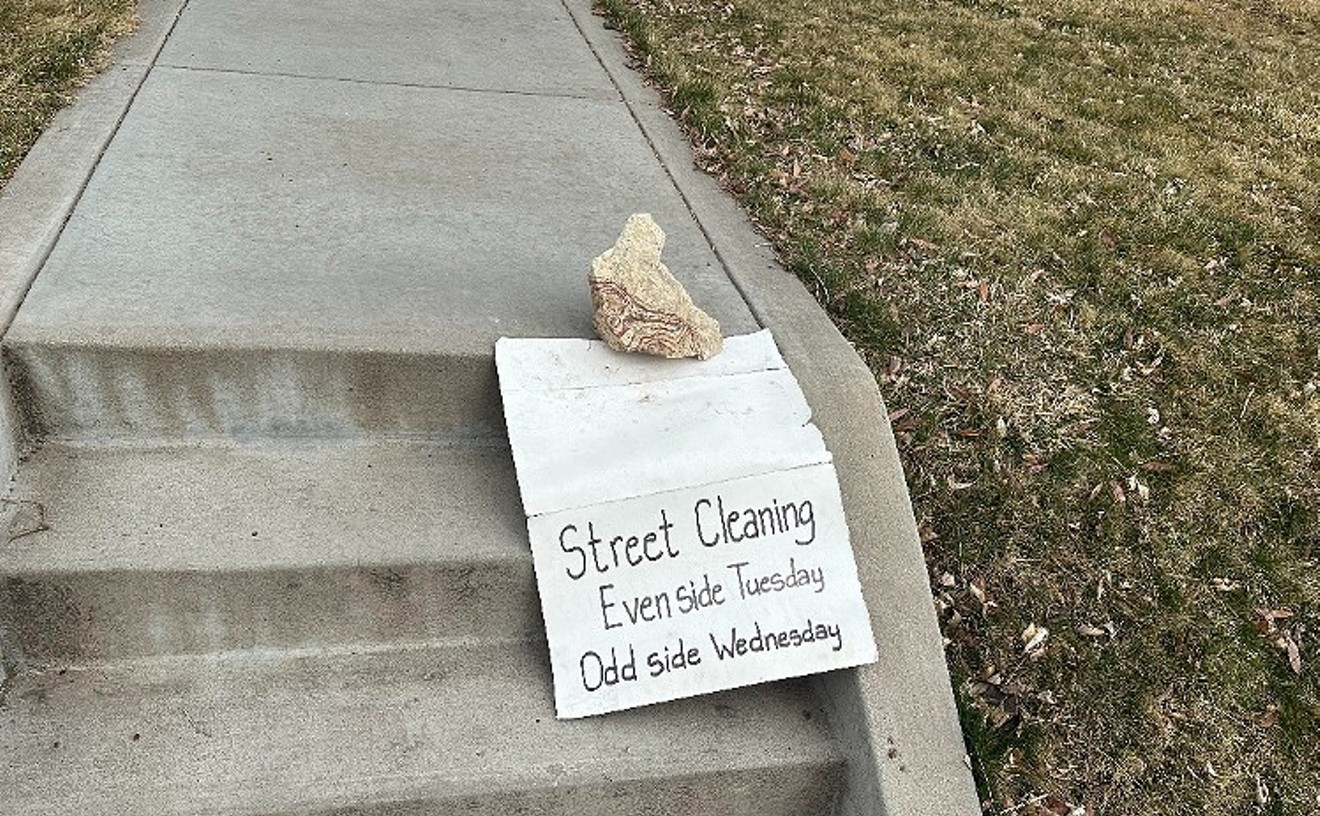Ford was fired over the episode, only to be reinstated late last year after a review by the city's Career Service Board; our December 18, 2015, coverage of the topic has been incorporated into this post. And astonishingly, Ford continues to be employed as a deputy with the Denver Sheriff Department — and his status won't be impacted by the payout.
The backstory: In July 2014, as we reported, then-Denver sheriff Gary Wilson asked the Denver District Attorney's Office to launch a criminal investigation into the conduct of Deputy Ford.
The spark for this move, which took place against the backdrop of numerous inappropriate-action claims aimed at Colorado law enforcement (several of which were brought to the public's attention via lawsuit), was the publication by the Colorado Independent of a video showing Ford in action.
The seventeen-second clip obtained by the Independent was captured at the Denver jail. In it, Ford can be seen at a copy machine as an inmate — Askin — sits against a wall opposite him. Then, Askin apparently says something that the deputy doesn't like; later reports suggest that he threatened Ford's daughter and promised to "kick your ass" and "fuck you up." Ford reacts by marching toward Askin, who stands but doesn't raise his hands, and lays him out with a single punch. Askin falls to the ground, apparently unconscious.
Here's the video.
In August, the Denver District Attorney's Office declined to prosecute Ford — but the next month, he and another deputy, Edward Keller, were fired.
The connection between the deputies? Ford was present when Keller allegedly roughed up an inmate, Jamal Hunter, in Denver jail.
As you'll recall, Hunter filed a lawsuit in 2012 claiming that law enforcers didn't adequately protect him from fellow prisoners, who wound up scalding his genitals with boiling water while he was in custody circa 2011.
Here's a screen capture of video showing Keller throttling Hunter. Ford can be seen on the right.
In regard to the punch-out, Ford told investigators that he had felt threatened by Askin. Here's part of Ford's statement:
So I went over there. I approached him. My sole intention was to place him in a cell. I still had the water bottle in my hand. I still had the print pads in my hand. I had no intention of getting into a physical altercation with this guy. So, but when he — he popped up off the bench. I didn't tell him to get up. I didn't give him an order. He popped up off the bench in an aggressive manner. His body was tense, and his face, and then, based off of his previous threats about what he was going to do to me, I felt threatened and I defended myself, and I defended myself with a — with a strike to the face...a strike that we are taught in the Academy to defend ourselves against threats.This explanation was discredited in Ford's termination letter, also shared below. Here's an excerpt:
After examining the totality of the circumstances, [it] is more likely than not, based upon a preponderance of the evidence, that the purpose of Deputy Ford's strike was not to defend himself, but rather, to retaliate against and punish an inmate who had been consistently making threats against and disparaging remarks to Deputy Ford. It is simply incredible that Deputy Ford decided to move a hostile inmate, whom he felt threatened by, one handed, without assistance, and without notifying a supervisor. If Deputy Ford had a legitimate correctional purpose — that is, to move inmate Askin to an isolation cell — Deputy Ford's reasonable course of action would have been to seek assistance or, at the very least, to free up his hands in order to physically move the inmate or in case the inmate became aggressive in the process. Instead, the evidence shows that Deputy Ford himself initiated the confrontation by aggressively and purposefully approaching inmate Askin, who was seated, while making statements to the inmate. Inmate Askin then stood up and did not make any further movements. The evidence suggests that inmate Askin stood up as either a response to a perceived threat from Deputy Ford's purposeful and aggressive approach, or to comply with Deputy Ford's instruction that he was going to be transported to an isolation cell. It is also incredible that Deputy Ford felt threatened at this point. If Deputy Ford was truly approaching inmate Askin for a legitimate correctional purpsoe, and he suddenly felt threatened by inmate Askin standing up, it is reasonable to believe that Deputy Ford would have stopped or at least slowed, given verbal commands, or called for assistance. However, Deputy Ford continued his approach and struck Askin in the face with a closed fist, without hesitation, provocation, or justification. Once inmate Askin fell to the ground, Deputy Ford further communicated his purpose by kicking inmate Askin. Therefore...the totality of the circumstances indicates that Deputy Ford had no legitimate correctional purpose for his actions, and instead, acted with the purpose of retaliation and punishment. Deputy Ford used inappropriate force against and committed an assault of inmate Askin.Why did the Career Service Board choose to reinstate Ford? The complete decision document is also shared here — but the following passage suggests that the board members, including co-chair Gina Casias, saw the punishment of Ford as being more severe than that meted out against previous law enforcers who'd allegedly committed similar acts:
We are not saying that a deputy could not properly be discharged for a single instance of excessive or inappropriate force. We are saying, however, that based on matters that have come before us, this is plainly NOT the policy of the Denver Sheriff's Department or the City's Department of Safety.
The agency may very well adopt alternate disciplinary policies for the use of inappropriate force against inmates. It has not done so. Rather, using the Disciplinary Matrix and Handbook, the agency is issuing ten-day suspensions, thirty-day suspensions, forty-two-day suspensions and discharges, all for acts that appear to be of comparable severity.
We are aware of no other Deputy who has been discharged for a single non-lethal use of inappropriate force who has also not been found to have committed deceptive acts. After reviewing the record in this case, we can discern no appreciable distinction between this case and other cases we have decided. Accordingly, we conclude the Hearing Officer erred in finding that discharge was within the range of alternatives available to a reasonable and prudent administrator operating under the Disciplinary Matrix and Handbook. We find the penalty of discharge in this case, based on these facts, to be clearly excessive.
Director of Safety O'Malley was clearly frustrated by the board's proclivity for lessening punishment against employees such as Ford. A statement released in the wake of the board's decision reads:
By frequently reversing sound disciplinary orders issued by my office, the Career Service Board is undermining our authority as an employer and preventing us from appropriately disciplining deputies who have violated department rules and regulations. Based on the facts and evidence, Deputy Ford clearly used inappropriate force during his interaction with the inmate, which is unacceptable to us and to the community. Our view remains that termination is warranted, and after conferring with the City Attorney’s Office, we have decided to appeal the Board’s decision to the Denver District Court.A year later, the appeal is still pending and Ford remains on the job, though he's reportedly in a position that precludes direct contact with inmates. Meanwhile, the Denver City Council approved the settlement yesterday. Askin is set to get $36,908, while Rathod-Mohamedbhai, the law firm that represented him, will receive $28,091.20 for its efforts.
Here's the reinstatement decision document, followed by the termination letter.
Deputy Thomas Ford Career Service Board Decision
Thomas Ford Termination Letter











